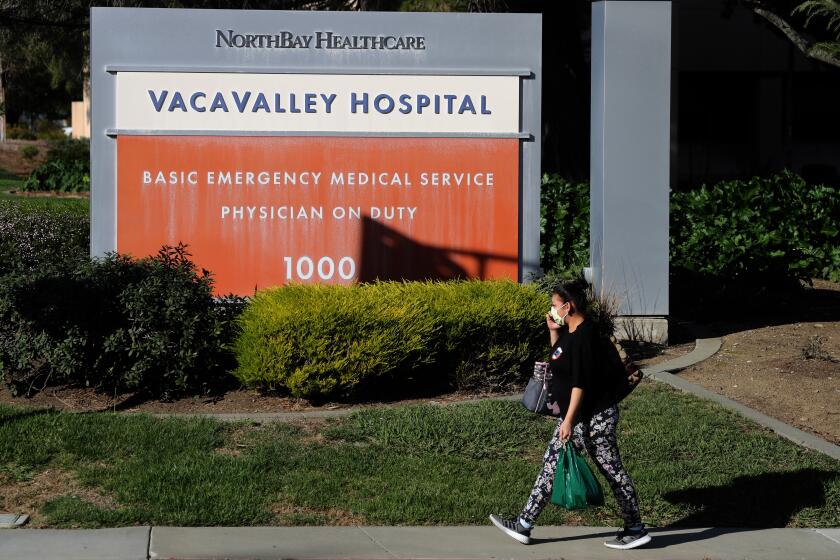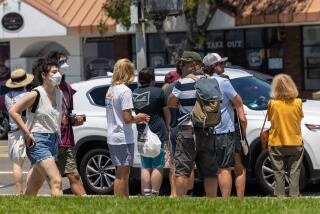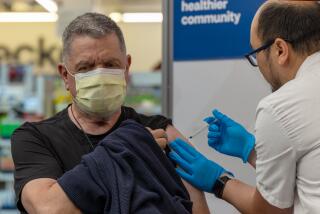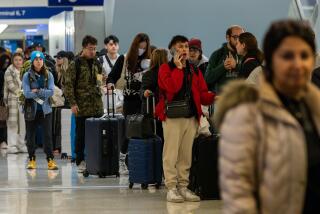Second person dies of coronavirus in Washington state as cases spread on West Coast
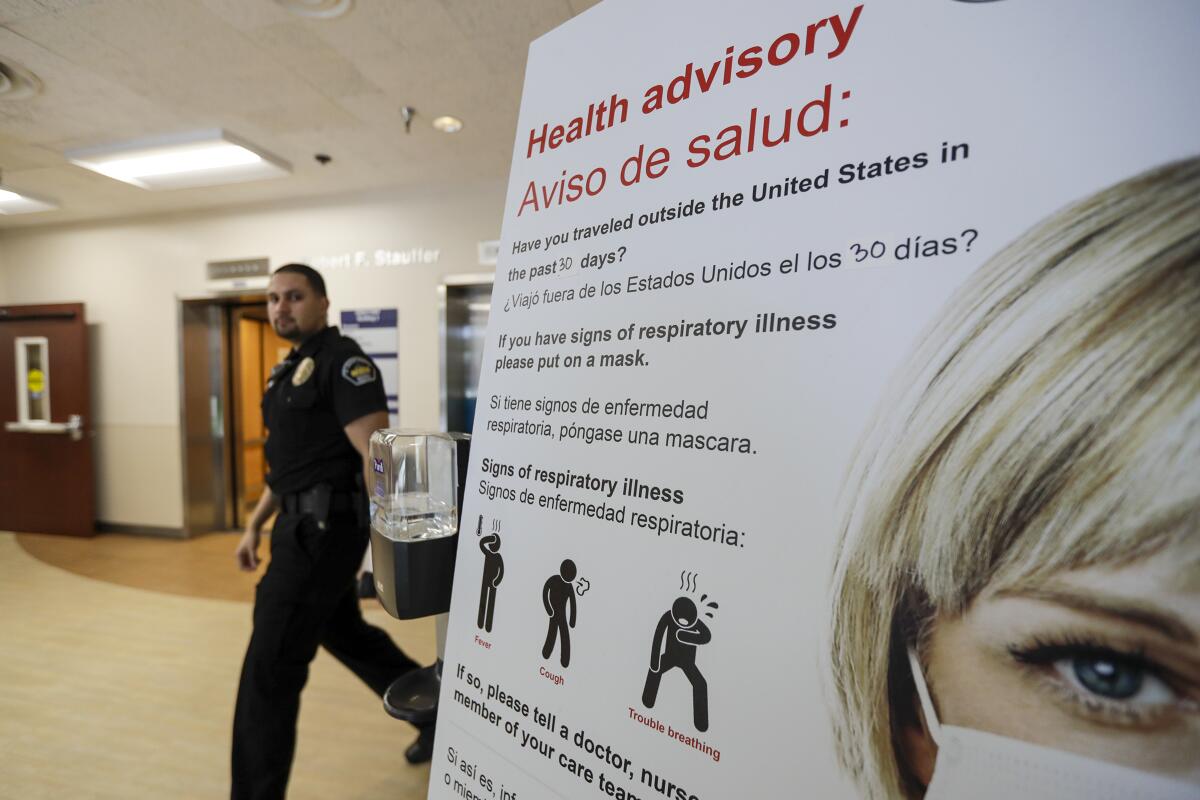
A second person has died of the novel coronavirus in Washington state as the number of those infected with the disease continues to rise across the country, including California, health officials said Sunday.
The man, who was described as being in his 70s and suffering from preexisting health problems, died Saturday at EvergreenHealth Medical Center in Kirkland, a suburb of Seattle, state health officials said. Four additional cases were confirmed in King County — all in elderly patients — bringing the total number of cases there to 10.
The news came hours after two healthcare workers at a hospital in California’s Solano County were reported to have contracted the COVID-19 coronavirus after being exposed to a patient who was initially admitted there, and three more people were diagnosed with the virus in Santa Clara County, officials announced Sunday.
The two healthcare workers were exposed to the virus from a patient who was being treated at NorthBay VacaValley Hospital in Vacaville, officials said. The female patient has since been transferred to UC Davis Medical Center in Sacramento and is considered the nation’s first announced case of “community spread,” meaning the source of infection is unknown.
That woman was not immediately tested for the virus because she did not fit federal testing criteria at the time. Officials had already expressed concern that she could have infected others in that time.
The case led to 124 nurses and healthcare workers being asked to self-quarantine, according to the California Nurses Assn.
“Our two health care workers who tested positive have been in isolation at home since the day we learned they had contact with the patient who had contracted the virus,” Aimee Brewer, president of NorthBay HealthCare Group, said in a statement. “We took immediate and comprehensive measures intended to stop any further spread of the virus, including working with public health officials to trace the contacts the two workers may have had.”
One of the infected healthcare workers is a Solano County resident and the other lives in Alameda County, officials said. They are both in isolation at home.
The case is the first for Alameda County, which has declared a local public health emergency in response.
“This news is not unexpected in the Bay Area, and we are ready for cases here,” Dr. Erica Pan, health officer for the Alameda County Public Health Department, said in a statement. “This is not the time to panic; now is the time for all of us to work together.”
Meanwhile, three more people were diagnosed with COVID-19 in Santa Clara County on Sunday, health officials said.
One is an adult woman with chronic health conditions. An investigation into how she acquired the infection was just launched, the Santa Clara County Public Health Department said Sunday evening.
The other two patients are a husband and wife who had recently traveled to Egypt.
All three are hospitalized, officials said. Additional information about their condition was not available.
The Public Health Department was working to identify all those who had come into contact with the three cases and said it would also conduct community surveillance “to determine the extent of possible disease spread in our community.”
California has recorded at least 157 cases of COVID-19, including four deaths, in more than a dozen counties.
In addition to more than 60 cases of COVID-19 in the U.S. linked to travel abroad, officials have announced that at least 10 people appear to have contracted the virus in their communities. An outbreak at a long-term care facility in Washington state is expected to push that total higher in the coming days, officials said.
Of the new cases reported in Washington on Sunday, two involved men in their 60s with underlying health conditions. One was in critical but stable condition at Valley Medical Center in Renton; the second was in critical condition at Virginia Mason Medical Center in Seattle.
It wasn’t immediately clear whether the cases were thought to be related to the long-term care facility, Life Care Center of Kirkland, where officials announced Saturday that one resident and one staffer had been diagnosed with the coronavirus and more than 50 others had developed symptoms.
In addition, 25 firefighters who responded to calls at the facility were possibly exposed to the virus and have been quarantined, the International Assn. of Fire Fighters announced Sunday. The firefighters followed proper protocols, including those related to personal protective equipment, based on information they received from emergency dispatchers, but the information Life Care Center provided to dispatchers “may not have been completely accurate,” the firefighters union’s statement said.
Authorities announced Saturday that a King County man in his 50s with underlying medical conditions had become the first person in the U.S. to die from the coronavirus. Officials said they did not know how he became ill, though he was admitted to EvergreenHealth Medical Center in Kirkland at the same time as at least one of the other COVID-19 patients in Washington.
Researchers scrambling to unravel the mystery of increasing coronavirus infections in the Seattle area suspect that the virus has been circulating for weeks undetected in Washington state.
Trevor Bedford, a computational biologist at the Fred Hutchinson Cancer Research Center, tweeted Saturday that genetic similarities between the state’s first case Jan. 20 and a case announced Friday indicated that the newer case may have descended from the earlier one.
The Jan. 20 case, the first known in the U.S., was that of a man who had traveled to Wuhan, China. He recovered after being hospitalized and treated in isolation.
“I believe we’re facing an already substantial outbreak in Washington State that was not detected until now due to narrow case definition requiring direct travel to China,” Bedford wrote on Twitter. “Our best current expectation is a few hundred current infections.”
Bedford, who uses powerful computers and complex statistical methods to study the rapid spread of viruses, was not available Sunday for interviews, said Claire Hudson, communications manager at Fred Hutchinson Cancer Research Center. She referred reporters to a statement, which said:
“Infectious disease researchers at Fred Hutch are contributing to scientific efforts to test, track and model the evolving COVID-19 outbreak. In collaboration with the global scientific community and public health officials, they are working to track the genomic profile of the virus, understand its evolution compared to related viruses, and design vaccine study protocols.”
Amid fears that COVID-19 is already circulating in local communities, stores across Southern California and nationwide have been experiencing a surge in demand for health gear, shelf-stable food and other supplies as people try to protect themselves from the virus and stock up in case of quarantine or scarcity. Some stores said the number of customers was similar to crowds seen during the Christmas holiday.
Lines also formed outside Costco stores in the Seattle and Portland areas as shoppers stocked up on food and supplies.
Churches are also taking precautions.
The Roman Catholic Diocese of San Bernardino, which serves San Bernardino and Riverside counties, announced that parishes have the option “to implement liturgical restrictions that are allowed during the annual flu season,” according to a letter from the Office of the Vicar General.
They include encouraging parishioners to refrain from holding or shaking hands during service, even during rituals that usually require it; to receive Communion by hand instead of on their tongue; and to refrain from drinking the consecrated wine. Ministers should also sanitize their hands before and after distributing Communion and stay home if they’re sick, the letter says.
The Diocese of Orange has made those restrictions mandatory because of the local health emergency declared by Orange County last week, according to a statement sent to pastors. The bishop has also exempted those who are sick from attending Mass on Sundays and holy days of obligation until further notice.
Experts said the virus was most likely to start spreading in coastal hubs of international travel. San Francisco, New York and Los Angeles typically receive the most passengers flying from Wuhan, China, where the outbreak began, on a daily basis.
Officials on Saturday announced that a woman described as “a household contact” of a Santa Clara County patient whose diagnosis was made public Friday had also contracted the virus. The county’s health department is working to identify any people the Santa Clara County woman may have come into contact with who may be at risk, officials said.
Voluntary quarantining extended to students at UC Davis and other college campuses, and workers at the NorthBay and UC Davis hospitals where the Solano County woman, who had no known links to foreign travel, was treated. Three UC Davis students were put in 14-day isolation Thursday as one awaited test results after showing mild coronavirus symptoms. On Saturday, it was determined that that student did not have the virus. Another of those students also has tested negative for the virus.
It’s likely that the spate of new cases was brought to light because of increased local testing capabilities and updated federal screening guidelines.
The Solano County woman who was eventually diagnosed with the coronavirus was not tested for several days because she did not fit screening criteria set by the Centers for Disease Control and Prevention, which at the time recommended that only those with symptoms of the virus and a recent history of travel overseas, or contact with a confirmed coronavirus patient, should be tested.
On Thursday, the CDC updated its guidelines to recommend testing of anyone with severe respiratory illness, regardless of whether they had traveled or were known to have been otherwise exposed to the coronavirus. The move was widely interpreted to be a response to the woman’s diagnosis.
In Washington, those new guidelines prompted officials at EvergreenHealth Medical Center to “look at our most critically ill patients,” which led to the testing of the first King County man who later died of the coronavirus, said Dr. Frank Riedo, medical director of infection control.
That man was reported as having the coronavirus by Washington’s Public Health Laboratories, which only recently acquired coronavirus test kits, Dr. Jeffrey Duchin, health officer for Public Health Seattle and King County, said Saturday.
“If we had the ability to test earlier,” Duchin said, “I’m sure we would have identified patients earlier in the community.”
California’s health department recently announced eight testing labs that can handle coronavirus cases, in Los Angeles, Orange, Ventura, San Diego, Contra Costa, Alameda, Santa Clara and Tulare counties. Officials also announced the arrival of 1,200 testing kits from the federal government.
“The availability to test at California’s public health laboratories is a significant step forward in our ability to respond rapidly to this evolving situation,” Dr. Sonia Angell, director of the California Department of Public Health and state health officer, said in a statement. “As we face the likelihood of community transmission here in California, having this resource where we need it is essential to better inform public health response and protect our communities.”
Testing at state laboratories also resulted in new diagnoses in Washington, Illinois and Rhode Island.
The person who tested positive in Illinois is hospitalized in isolation, officials said.
The Rhode Island patient, a person in their 40s, was also being treated at a hospital. The patient, who had traveled to Italy in mid-February, had limited travel in Rhode Island since returning and had not returned to work, officials said.
Vice President Mike Pence said Sunday on CNN’s “State of the Union” that more than 15,000 testing kits were sent to local public health laboratories over the weekend.
That came after he spoke with multiple governors who described increasing local testing capacity as a top priority, he said.
In addition, Pence said, the Food and Drug Administration has approved a testing regimen that local authorities can use, and the government is working with a commercial provider to send out an additional 50,000 test kits.
“So we’re addressing it. We’re leaning into it,” Pence said. “And more importantly, we’ve established a process in a number of cities across the country where if someone presents at a local hospital with a respiratory ailment, we want them also tested for coronavirus, and so that’s why we’re going to move a lot of volume of testing kits.”
Health and Human Services Secretary Alex Azar on Sunday brushed aside criticism over the Trump administration’s handling of developments surrounding the spread of the coronavirus.
“I appreciate that people are concerned, and that is why we’re being radically transparent about what we know, and also what the full range of potential scenarios could be,” he said on ABC’s “This Week.” Azar added that the administration intended to treat Americans as “adults” and “explain to them that we don’t know where this will go, that we will see more cases.”
But some of the administration’s messaging remained confused. President Trump told reporters Saturday that the administration was looking “very strongly” at the southern border in connection with moves to keep the virus out, but Azar, in his ABC interview, played down the prospect of any move to curtail normal movement of people and goods from Mexico.
“That’s not one of the highest-priority areas that we’re looking at right now, because Mexico only has a couple of cases,” he said.
The Health and Human Services secretary also made a point of praising a senior official in his department who raised concerns that workers who dealt with repatriated Americans had not been given adequate training or protective gear.
Despite news reports that the Health and Human Services whistleblower sought federal protection and complained of being improperly reassigned after raising the alarm, Azar suggested the administration was glad the senior official spoke up.
“We appreciate the whistleblower bringing forward any concerns,” he said on “This Week,” adding that the agency was “aggressively” looking into whether there was “validity to the concerns.”
Both Azar and Pence, who was tasked by Trump last week with coordinating the administration’s coronavirus response, complained that the president’s opponents were seeking to politicize the outbreak.
Pence, interviewed on NBC’s “Meet the Press,” was asked repeatedly about comments by Trump’s allies suggesting that Democrats relished the outbreak as a chance to tarnish the president — particularly the president’s son Donald Trump Jr. saying that Democrats “seemingly hope [the virus] comes here and kills millions of people so that they could end Donald Trump’s streak of winning.”
Pence largely deflected the questions but also seemed to defend such remarks as valid. “When you see voices on our side pushing back on outrageous and irresponsible rhetoric on the other side, I think that’s important, and I think it’s justified.”
Azar, on ABC, defended the president’s use last week of the word “hoax” to describe criticism of the way the administration had handled the virus threat to date.
“He’s talking about the partisan sniping that we’re seeing,” he said. “We don’t need to have this made a political issue.”
But there was more criticism Sunday from former Vice President Joe Biden, fresh from his Democratic primary victory in South Carolina.
“The idea that Donald Trump said just several days ago this was a Democratic hoax — what in God’s name is he talking about?” Biden said on CNN’s “State of the Union.”
“What in God’s name is he talking about?” Biden repeated. “Has he no shame? We’re in a situation where — and I respect Vice President Pence, and his, him being put in charge, but we should be hearing from the scientists.”
Wigglesworth, Karlamangla and Vives reported from Los Angeles, King from Washington, D.C. and Read from Seattle.
More to Read
Sign up for Essential California
The most important California stories and recommendations in your inbox every morning.
You may occasionally receive promotional content from the Los Angeles Times.
